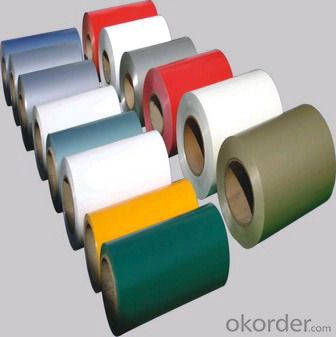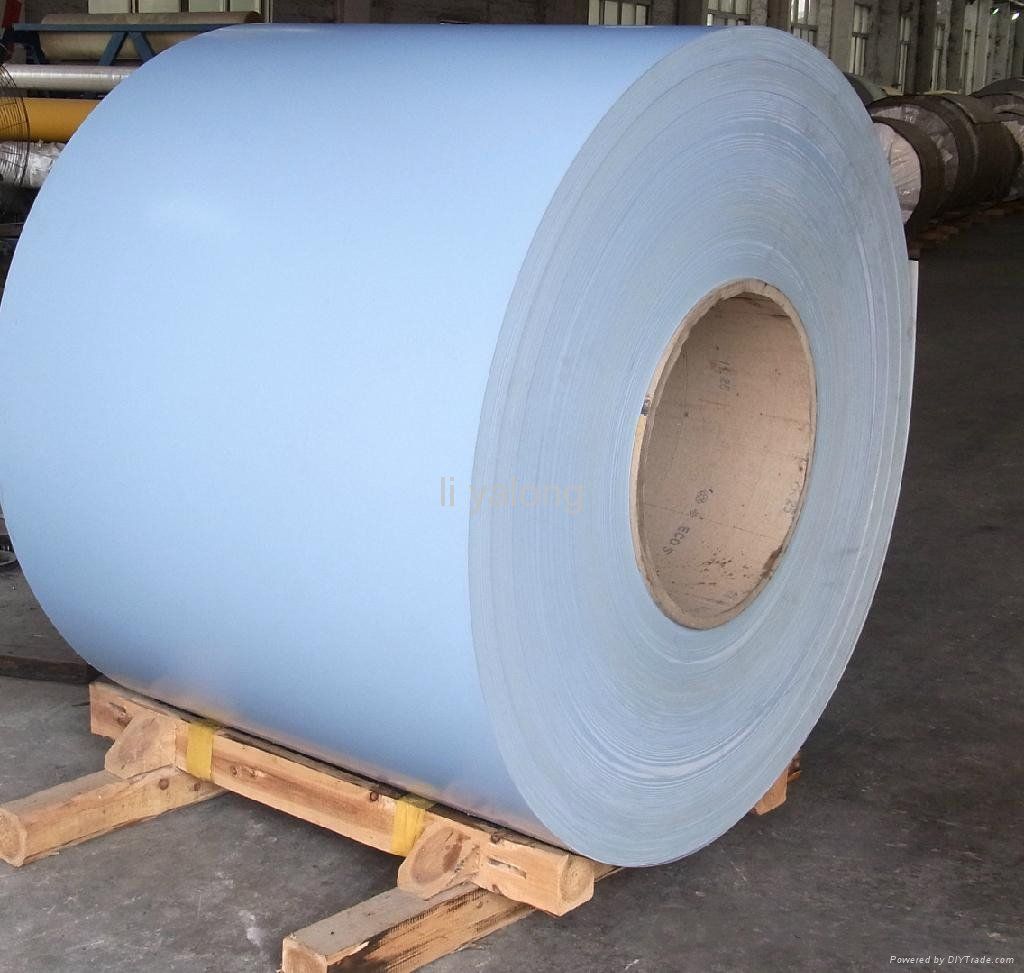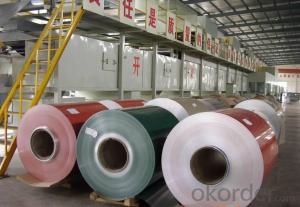RAL 1032 PVDF 22 Micros Coated Aluminium Coil
- Loading Port:
- Tianjin
- Payment Terms:
- TT OR LC
- Min Order Qty:
- 2 m.t.
- Supply Capability:
- 40000 m.t./month
OKorder Service Pledge
OKorder Financial Service
You Might Also Like
Item specifice
Description
Grade
| 1000 Series: 1050 1060 1070 1100 1200 1235 etc. 3000 Series: 3003 3004 3005 3104 3105 3A21 etc. 5000 Series: 5005 5052 5083 5086 5154 5182 5251 5754 etc. 6000 Series: 6061 6063 6082 6A02 etc. 8000 Series: 8006 8011 8079 etc. |
Thickness | 0.05~10mm |
Width | <1600mm |
Color | Metallic, Solid, RAL or by customer requirements |
Coating paint: | PVDF(Polyvinylidene Fluoride), PE(Polyester ) |
Coating thickness | as per customer’s request |
Gloss | 10-90%(EN ISO-2813:1994) |
Total coating thick | Polyester18~27micron(EN ISO-2360:1995) PVDF27 ~35micron(EN ISO-2360:1995) |
Coating hardness | 2H |
Protective film | PVC film, Colorless transparent or White-black |
Adhesion | 5B (EN ISO-2409:1994) |
Impact resistance | No cracking and peeling (A.S.T.M D2794-1993) |
Flexibility (T-bend) | 0T- 2T |
Temper | H16, H18, H24, H26, H26 |
Certification | ISO9001:2000, CE, SGS |
Coil's standard diameter | 1100mm |
Inner Diameter | 405mm/505mm |
Coil's standard weight | 2000kgs |
Payment | L/C ,T/T |


PE and PVDF Painting
Polyester Coatings (PE)
PE (polyester) coatings exhibit an excellent combination of hardness, flexibility, flow, appearance, and superior resistance to dirt retention in indoor and outdoor applications. These coatings are highly resistant to abrasion, metal marking, staining, and marring, and require minimal maintenance. Glazetech uses polyester paints which provide excellent colour and gloss retention properties.
Polyvinylidene Fluoride Coatings (PVDF)
PVDF (polyvinylidene fluoride) is a chemical resistant thick film barrier coating commonly used in architectural applications where both excellent appearance and substrate protection must be maintained over a long period of time. This coating is unaffected by most chemicals and solvents and has excellent wear and abrasion resistance. PVDF also has a high dielectric strength, excellent resistance to weathering and the ability to self extinguish.
Application
Widely used in manufacturing of products as well as other industrial applications like:
Products Materials: PP cap stock, the traffic sign, air-conditioner heat and exchangers, food container, household foil, pharmaceutical packing, cigarettes packing etc.
Building Materials: aluminum curtain wall base plate, ACP, aluminum, ceilings, aluminum sheets, honeycomb panels and aluminum roofing, lighting decoration, household electrical appliances, food package (such as pop can cover & ring-pull), furniture ect.
- Q:Can aluminum coils be used in curtain wall systems?
- Curtain wall systems can indeed incorporate aluminum coils. The lightweight property, durability, and resistance to corrosion make aluminum a favored material for curtain walls. Shaping and forming aluminum coils is a simple task, enabling the creation of desired profiles for these systems. Moreover, aluminum offers a broad spectrum of colors and finishes, allowing for customization and design adaptability. The utilization of aluminum coils in curtain wall systems also presents energy efficiency advantages, thanks to the commendable thermal conductivity properties of aluminum. In summary, aluminum coils are a fitting and widely employed material for constructing curtain wall systems.
- Q:Can aluminum coils be used in automotive manufacturing?
- Yes, aluminum coils can be used in automotive manufacturing. Aluminum is a lightweight and versatile material that offers various advantages in the automotive industry. It is commonly used to make parts like body panels, engine blocks, wheels, and heat exchangers. The use of aluminum coils in automotive manufacturing allows for improved fuel efficiency, as the reduced weight of the vehicle contributes to lower energy consumption. Additionally, aluminum has excellent corrosion resistance, making it suitable for use in various weather conditions. Overall, the use of aluminum coils in automotive manufacturing provides numerous benefits, making it a popular choice for many car manufacturers.
- Q:I'm doing a science project on Aluminum and need to know what the other metals are in the following ores:BauxiteCryoliteGibbsiteI have to know what percentage of it is which metal. Don't know if that makes much sense, but I really need help because I can't find the answer anywhere. Thanks :D
- The bauxite is a sedimentary rock of chemical origin composed for the most part by alumina (Al2O3) and, in smaller measure, iron oxide and silica. It is the main aluminum source used by the industry. It is a residual taken place by the meteorización of the igneous rocks under conditions geomorfológicas and climatic favorable. Molecular formula: Na3AlF6 Synonym: Fluoroaluminato of sodium. Chemisorption of catechol on gibbsite, boehmite, and noncrystalline alumina... Alumina; Aluminium Oxyhydroxyde
- Q:How are aluminum coils protected against galvanic corrosion?
- Aluminum coils are protected against galvanic corrosion through a combination of surface treatments and protective coatings. One common method is the application of a thin layer of anodization on the aluminum surface. Anodization involves electrolytically treating the aluminum with an acid solution, which creates a protective oxide layer on the surface. This oxide layer acts as a barrier, preventing the direct contact between the aluminum and other metals that may cause galvanic corrosion. Another method is the use of a protective coating, such as a polymer or paint, on the aluminum coils. These coatings provide a physical barrier between the aluminum and the environment, preventing the exposure of the metal to corrosive elements. The coatings are carefully selected to have good adhesion to the aluminum surface and excellent resistance to corrosion. In addition to surface treatments and coatings, proper design and material selection also play a crucial role in protecting aluminum coils against galvanic corrosion. By ensuring that dissimilar metals are not in direct contact and using compatible materials, the risk of galvanic corrosion can be minimized. This can be achieved through the use of isolation materials, such as gaskets or insulating tapes, to separate the aluminum coil from other metals in contact. Regular maintenance and cleaning also contribute to the protection against galvanic corrosion. It is important to remove any accumulated dirt, debris, or corrosive substances from the aluminum coils to prevent the formation of localized corrosion cells. Overall, a combination of surface treatments, protective coatings, proper design, and regular maintenance are essential in protecting aluminum coils against galvanic corrosion. These measures help to extend the lifespan and maintain the performance of the coils in various applications.
- Q:My favorite deodorant contains aluminum. It smells really good and it works really well.My mom doesn't like me using it because it contains aluminum.So I got aluminum free. It doesn't smell at all (I can't seem to find fragrant aluminum free deodorant) and it doesn't work as well, for some reason.I want to keep using the one with aluminum, but will it be harmful to me in the future?
- Aluminum, okorder /
- Q:What are the potential applications of mill-finished aluminum coils?
- Mill-finished aluminum coils have a wide range of potential applications due to their versatile properties and finishes. Some of the potential applications of mill-finished aluminum coils include: 1. Building and construction: Mill-finished aluminum coils are commonly used in the building and construction industry for various applications. They can be used for roofing, siding, wall cladding, gutters, and downspouts, among others. The mill finish provides a clean and smooth appearance, enhancing the aesthetic appeal of the building while also offering durability and corrosion resistance. 2. Automotive industry: Mill-finished aluminum coils find applications in the automotive industry due to their lightweight nature, high strength-to-weight ratio, and corrosion resistance. They can be used for manufacturing body panels, trims, and other components, contributing to fuel efficiency and reducing the overall weight of vehicles. 3. Electrical industry: Mill-finished aluminum coils are used in the electrical industry for various applications. They can be used for manufacturing electrical enclosures, transformers, busbars, and conductors due to their electrical conductivity and corrosion resistance. The mill finish ensures a high-quality surface finish for these electrical components. 4. Packaging industry: Mill-finished aluminum coils are widely used in the packaging industry due to their excellent barrier properties and formability. They can be used for manufacturing aluminum foil, cans, lids, and other packaging materials. The mill finish provides a smooth surface, making it suitable for printing and branding purposes. 5. Household appliances: Mill-finished aluminum coils are used in the manufacturing of household appliances such as refrigerators, ovens, and air conditioners. They provide a lightweight and corrosion-resistant solution for these appliances, ensuring durability and energy efficiency. 6. Aerospace industry: Mill-finished aluminum coils find applications in the aerospace industry due to their lightweight nature and high strength. They can be used for manufacturing aircraft structures, interior components, and other parts. The mill finish provides a smooth surface, ensuring aerodynamic efficiency and reducing drag. 7. Marine industry: Mill-finished aluminum coils are widely used in the marine industry for various applications. They can be used for manufacturing boat hulls, decks, and other components due to their corrosion resistance and lightweight properties. The mill finish ensures a clean and polished appearance, enhancing the aesthetics of the vessel. Overall, mill-finished aluminum coils have numerous potential applications across various industries due to their versatile properties, including lightweight, corrosion resistance, formability, and aesthetic appeal.
- Q:What's the color coated aluminum roll?
- The so-called color coated aluminum coil, refers to the surface of Aluminum Alloy the coloring process, because Aluminum Alloy properties is very stable, not easy to be corroded, the general surface after special treatment can ensure that at least 30 years do not fade, because of its low density, high hardness, weight of unit volume of metal materials is the lightest. The color of aluminum is a new material recently emerged in the field of the plastic doors and windows, and compared, the biggest advantage is that the degree of firmness and color changing, There is nothing comparable to this, and never faced steel have always been questioned "toxic" two words. Therefore, in high-grade market doors and windows, sunshine rooms, balcony packaging and other fields are widely used. Now, color coated aluminum rolls have become one of the most popular top decorative materials. It is a kind of green with environmental protection, durability and beauty. It has the following advantages as decorative materials unmatched by other products: uniform color, bright and smooth, durable, strong adhesion, acid and alkali corrosion resistance, weathering resistance, decay resistant friction resistance, resistance to ultraviolet radiation, strong weatherability.
- Q:Can aluminum coils be used in chemical processing plants?
- Yes, aluminum coils can be used in chemical processing plants. Aluminum is a versatile and widely used material in various industries, including chemical processing. It has excellent corrosion resistance properties, which make it suitable for handling and transporting various chemicals. Aluminum coils can be used in heat exchangers, condensers, evaporators, and other equipment in chemical processing plants. Additionally, aluminum coils offer lightweight and high thermal conductivity, which allows for efficient heat transfer and energy savings. However, it is important to consider the specific requirements and compatibility of the chemicals being processed to ensure that aluminum coils are suitable for the intended application.
- Q:Are aluminum coils resistant to oil and grease?
- Yes, aluminum coils are generally resistant to oil and grease.
- Q:What are the potential risks of using aluminum coils in specific applications?
- Using aluminum coils in specific applications presents several potential risks. Firstly, due to its high reactivity, aluminum can undergo oxidation and form aluminum oxide. While this oxide layer can be protective, it can break down in certain environments, like acidic or alkaline conditions, leading to corrosion and compromising the coils' structural integrity and lifespan. Secondly, aluminum coils have lower strength compared to metals like steel, making them vulnerable to deformation or damage under heavy loads or high pressure. Mechanical stress can cause bending or cracking, resulting in potential failure. Furthermore, aluminum has a relatively low melting point compared to metals like copper or iron. As a result, when exposed to high temperatures, such as in heating or cooling systems, there is a risk of the coils melting or deforming, leading to system malfunctions, reduced efficiency, or safety hazards. Another risk lies in the electrical conductivity of aluminum coils. While aluminum conducts electricity well, its resistance is higher than copper. This can lead to increased power losses and reduced energy efficiency in electrical applications. Additionally, aluminum coils may be more prone to electrical arcing or sparking, posing a fire hazard. Lastly, it is important to note that aluminum is lightweight, which can be advantageous, but it also means that aluminum coils may have lower durability and resistance to physical impacts or external forces compared to heavier metals. In environments with vibrations, impacts, or other mechanical stresses, the coils may be more susceptible to damage or premature failure. In conclusion, although aluminum coils offer benefits like light weight, good thermal conductivity, and corrosion resistance, it is vital to carefully consider the potential risks associated with their use in specific applications. Proper design, maintenance, and compatibility with operating conditions are crucial to mitigate these risks and ensure the safe and effective performance of aluminum coils.
1. Manufacturer Overview |
|
|---|---|
| Location | |
| Year Established | |
| Annual Output Value | |
| Main Markets | |
| Company Certifications | |
2. Manufacturer Certificates |
|
|---|---|
| a) Certification Name | |
| Range | |
| Reference | |
| Validity Period | |
3. Manufacturer Capability |
|
|---|---|
| a)Trade Capacity | |
| Nearest Port | |
| Export Percentage | |
| No.of Employees in Trade Department | |
| Language Spoken: | |
| b)Factory Information | |
| Factory Size: | |
| No. of Production Lines | |
| Contract Manufacturing | |
| Product Price Range | |
Send your message to us
RAL 1032 PVDF 22 Micros Coated Aluminium Coil
- Loading Port:
- Tianjin
- Payment Terms:
- TT OR LC
- Min Order Qty:
- 2 m.t.
- Supply Capability:
- 40000 m.t./month
OKorder Service Pledge
OKorder Financial Service
Similar products
New products
Hot products
Related keywords




























